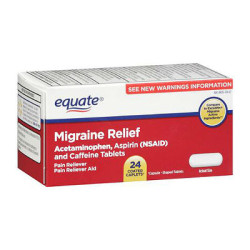 Last Tuesday, customers who alleged that Wal-Mart mislead them about the price and potency of its store brand migraine medicine in a class action lawsuit argued that the Ninth Circuit should hear their case.
Last Tuesday, customers who alleged that Wal-Mart mislead them about the price and potency of its store brand migraine medicine in a class action lawsuit argued that the Ninth Circuit should hear their case.
The class action lawsuit alleges that Wal-Mart fraudulently induced migraine sufferers to pay $9 for Wal-Mart’s store brand migraine medicine, Equate Migraine, when the pills actually contained the same medicine as the less expensive $3 store brand headache medicine, Equate Extra Strength. Lead plaintiff Timothy Boris filed the initial class action in September 2013.
The plaintiffs claim that the more expensive migraine medicine’s packaging, including using an “urgent” red box, duped customers into believing they were getting a more potent product; however, a judge on the Ninth Circuit’s panel disagreed, pointing out that Wal-Mart had no obligation to disclose to consumers that they could get the same pill at a cheaper price.
“There’s no question that it is a pill that does treat migraines,” said Judge Carlos T. Bea during arguments. “What he’s not being told is you can get the same medicine for $3 if you just take the medicine that says headache.”
The class action lawsuit was appealed to the Ninth Circuit, where representatives for the plaintiffs argued that Wal-Mart had indeed committed fraud in its marketing of the migraine medicine.
“We believe that we have alleged that the huge price disparity between the migraine pills and the extra-strength pills, in combination with the bright red packaging of the migraine pills, indicated to the market and to reasonable consumers acting reasonably under the circumstances that the product that was three times more expensive was more potent or more efficacious,” argued a representative for the class action plaintiffs.
“The deception wasn’t to say that there was a cheaper alternative,” continued the representative attempting to counter the argument by Judge Bea. “The deception was that there are two products from the same brand, that are pharmaceutically identical pills, yet selling one for three times as much as the other and changing the color of the packaging from one to the other.”
The representative argued further that the class action lawsuit should be reinstated because even if normal consumers are expected to read the ingredient list on the packaging of both the migraine and headache medicine, they could not have known that the ingredients were in the same amounts. “[T]he reasonable consumer isn’t a pharmacologist,” said the plaintiffs’ representative.
A representative for Wal-Mart argued that the store shouldn’t be held accountable because each medicine goes through a different regulatory process under U.S. Food and Drug Administration regulations. Wal-Mart’s representative pointed out that prices depend on costs, availability, demand, and competition, and for the California court system to hold Wal-Mart accountable would be overstepping judicial boundaries.
The plaintiffs are represented by Lester L. Levy, Matthew T. Insley-Pruitt and Michele F. Raphael of Wolf Popper LLP; Edwin J. Kilpela Jr., Benjamin Sweet and Jamisen A. Etzel ofCarlson Lynch Sweet & Kilpela; Jennifer M. Miller and Jonathan D. Miller of Nye Peabody Stirling Hale & Miller LLP; John Zaremba of Zaremba Brownell & Brown PLLC; and Brian D. Penny of Goldman Scarlato & Penny PC.
The Wal-Mart Over-Priced Migraine Medicine Class Action Lawsuit is Boris, et al. v. Wal-Mart Stores Inc., et al., Case No. 14-55752, in the U.S. Court of Appeals for the Ninth Circuit.
ATTORNEY ADVERTISING
Top Class Actions is a Proud Member of the American Bar Association
LEGAL INFORMATION IS NOT LEGAL ADVICE
Top Class Actions Legal Statement
©2008 – 2025 Top Class Actions® LLC
Various Trademarks held by their respective owners
This website is not intended for viewing or usage by European Union citizens.














